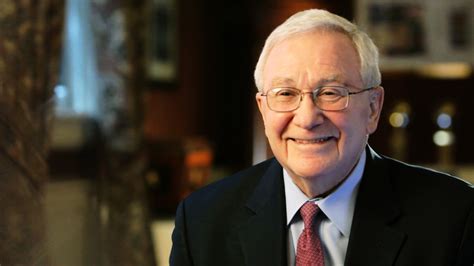A Quote by Ludwig Wittgenstein
'Imagine a person whose memory could not retain what the word 'pain' meant-so that he constantly called different things by that name-but nevertheless used the word in a way fitting in with the usual symptoms and presuppositions of pain'-in short he uses it as we all do. Here I should like to say: a wheel that can be turned though nothing else moves with it, is not part of the mechanism.
Related Quotes
I find that readers are very interested in how things are translated. I just turned in the first part of this father-son Odyssey, and there is a part when I digress and explain that the name Odysseus is related to the word for pain. Like "-odyne" in the word "anodyne," pain. It's the same, "-odyne" as in Odysseus. He's the man who both suffers endlessly, in trying to get home, but also inflicts a lot of suffering on everyone he visits.
Stress does not cause pain, but it can exacerbate it and make it worse. Much of chronic pain is 'remembered' pain. It's the constant firing of brain cells leading to a memory of pain that lasts, even though the bodily symptoms causing the pain are no longer there. The pain is residing because of the neurological connections in the brain itself.
But pain may be a gift to us. Remember, after all, that pain is one of the ways we register in memory the things that vanish, that are taken away. We fix them in our minds forever by yearning, by pain, by crying out. Pain, the pain that seems unbearable at the time, is memory's first imprinting step, the cornerstone of the temple we erect inside us in memory of the dead. Pain is part of memory, and memory is a God-given gift.
Words can mean different things to different people. It is important to understand what people mean when they use a certain word. Let's make an example. Take the word gay. Fifty years ago, gay meant exclusively cheerfulness, lighthearted excitement, merry or bright colors. Today this word has a different meaning. You won't call a cheerful person gay because it could be understood as something else.
Feelings come and feelings go, And feelings are deceiving; My warrant is the Word of God-- Naught else is worth believing. Though all my heart should feel condemned For want of some sweet token, There is One greater than my heart Whose Word cannot be broken. I'll trust in God's unchanging Word Till soul and body sever, For, though all things shall pass away, HIS WORD SHALL STAND FOREVER!
You know the pain is part of the whole thing. And it isn’t that you can say afterwards the pleasure was greater than the pain and that’s why you would do it again. That has nothing to do with it. You can’t measure it, because the pain comes after and it lasts longer. So the question really is, Why doesn’t that pain make you say, I won’t do it again? When the pain is so bad that you have to say that, but you don’t.
Have you ever experienced a pain so sharp in your heart that it's all you can do to take a breath? It's a pain you wouldn't wish on your worst enemy; you wouldn't want to pass it on to anyone else for fear he or she might not be able to bear it. It's the pain of being betrayed by a person with whom you've fallen in love. It's not as serious as death, but it feels a whole lot like it, and as I've come to learn, pain is pain any way you slice it.
Poetry has its uses for despair. It can carve a shape in which a pain can seem to be; it can give one’s loss a form and dimension so that it might be loss and not simply a hopeless haunting. It can do these things for one person, or it can do them for an entire culture. But poetry is for psychological, spiritual, or emotional pain. For physical pain it is, like everything but drugs, useless.
Sara waited a respectful time, knowing there was nothing she could do to ease the woman's pain. Grief was a place, Sara understood, where a person went alone. It was like a room without doors, and what happened in that room, all the anger and the pain you felt, was meant to stay there, nobody's business but yours.
Whenever we remember a series of events, we remember them different. We are constantly changing. It's a flaw, but on the other hand, when we say a word, the meaning is not what you put into it. Rather, the meaning of the word is all of the past usages of that word. Like this cloud that makes up the meaning of the word. It's your subject if you write. For instance what you put in that word and what you assume it means, even its flaw. It has a general agreement.
I want to make it clear, though, that I am not trying to say these are bad drugs. Opioid medications in the short term for severe pain are very effective. The problem is when they are used for long-term chronic pain. No one wants anyone to suffer and be in pain. But realize how addictive these drugs are and get off of them as quickly as you can. So 'Warning: This Drug May Kill You' is really more about educating people about these drugs so that everyone can make their own decision about their pain versus the addictive nature of these drugs.
When you get called the n-word, as a black person you can do anything. It's like getting a gold star in Super Mario Brothers and junk. I hear the music when I hear the n-word. I get right into it; I get really into it. You can do anything. You could be in a fancy restaurant - just start throwing poop at the walls. People be like, 'What are you doing?' 'Someone called him the n-word.








































